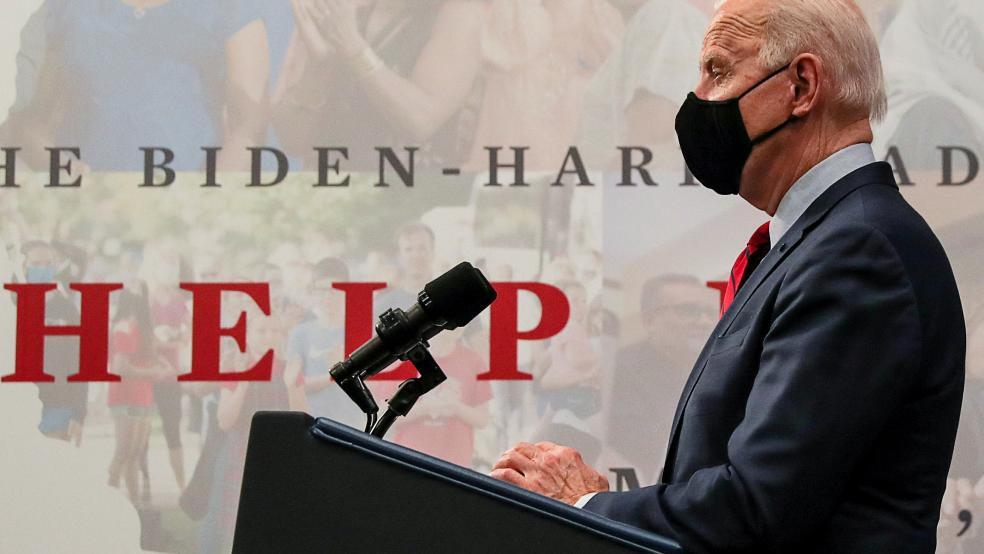President Obama signed the Patient Protection and Affordable Care Act into law 11 years ago. President Biden and Democrats marked the anniversary Tuesday by celebrating the law — even as they look to continue to expand it and defend it against a challenge in the Supreme Court.
After years of Republican attacks and Trump administration efforts to undercut the law, Obamacare is now expanding.
“On this anniversary, we should remember just how close we have come to losing that act that we fought so hard for, and we have a duty not just to protect it but to make it better and keep becoming a nation where health care is a right for all and not a privilege for a few,” Biden said in a speech Tuesday in Ohio.
Biden’s Covid-19 rescue act temporarily raised Obamacare premium subsidies for two years to help better deliver on the ACA’s titular promise of making insurance coverage more affordable. “The provision in the $1.9 trillion ‘American Rescue Plan’ is the first major change to the health law since its passage,” Sheryl Gay Stolberg writes at The New York Times. “The new subsidies last for only two years, and it will take some time for the full emergency aid to reach people. Even so, nearly everyone who buys insurance will be eligible to do so at a discount.”
On top of that, at least two red states, Alabama and Wyoming, are also considering whether to expand Medicaid under the ACA now that the Covid-relief package sweetened the incentives for doing so.
And a special enrollment period opened by the Biden administration last month to allow more people to get ACA plans in the midst of the coronavirus pandemic has seen more than 206,000 people sign up in its first two weeks. Biden, who memorably told Obama that the health reform law was a “big f---ing deal,” announced Tuesday that the special enrollment period, which had been slated to run until May 15, will now be extended through August 15.
“The ACA is over a decade old and this is literally the first time that Democrats have been successful at improving it,” analyst Larry Levitt of the nonpartisan Kaiser Family Foundation told the Associated Press. “Democrats have succeeded politically by selling the ACA’s protections for preexisting conditions, but affordability has always been a challenge. And now Democrats have successfully improved the premium help available under the law.”
Pandemic puts the ACA to the test: “We still have millions of people walking around without insurance,” Jonathan Cohn, the author of a new history of the enactment of the ACA, told The Washington Post. “The pandemic was a reminder that we still have huge gaps in our health care system, with immense human consequences.”
Obamacare may have helped close some of those gaps, though. The Kaiser Family Foundation estimated late last year that some 2 million to 3 million people may have lost employer-based coverage as the pandemic raged between March and September. But it added that many of those who lost coverage through their jobs were eligible for Medicaid of subsidized ACA plans.
“This is really the first true test of the A.C.A.,” the foundation’s Cynthia Cox told the Times. “In past recessions, you usually see the uninsured rate increase significantly. We don’t know for sure yet, but all indications are that the uninsured rate has not gone up by much, likely in large part thanks to the A.C.A.”
KFF’s Levitt added in a tweet: “The right still views the ACA as a government overreach. The left sees it as not going far enough in guaranteeing universal coverage and getting profit out of health care. But, imagine this pandemic and economic crisis without the ACA there as a safety net.”
More tests ahead: Biden may have scored relatively easy wins via both executive action and legislation, but advancing other elements of his health care agenda — the creation of a public option to compete with private insurers on the ACA exchanges, expanding Medicare eligibility and lowering prescription drug prices — likely will prove much more challenging. “These mainly require the support of Congress, where Democrats hold only slim majorities in both houses -- and some in the party are still pushing for more dramatic changes, including enacting ‘Medicare for All,’” CNN’s Tami Luhby says.
The Biden administration is reportedly considering a push to allow Medicare to negotiate drug prices as a way to help pay for some $3 trillion in new spending it plans to propose. “We’ve got to address the sector’s pricing abuses, and that’s fundamentally the big question the administration and Congress are facing,” Frederick Isasi, executive director of Families U.S.A., a consumer advocacy group, told the Times. “Are they going to have the political will to do that?”
Politico reports that that the answer may well be yes, as Democrats “appear intent on using their razor-thin congressional majorities to finally push through a drug pricing overhaul for at least one simple reason: It’s one of the few issues under consideration that would save money in a sprawling package expected to cost trillions.”
As for the public option, Biden still faces pressure from within his own party to go further. Progressives recently introduced another Medicare for All bill, an approach to health care reform that Biden has rejected.
Then there’s the Supreme Court challenge. The Biden administration last month urged to court to uphold the law in the face of a Republican-led lawsuit seeking to invalidate it. The court heard arguments in the case last November and is expected to hand down a ruling by July.





